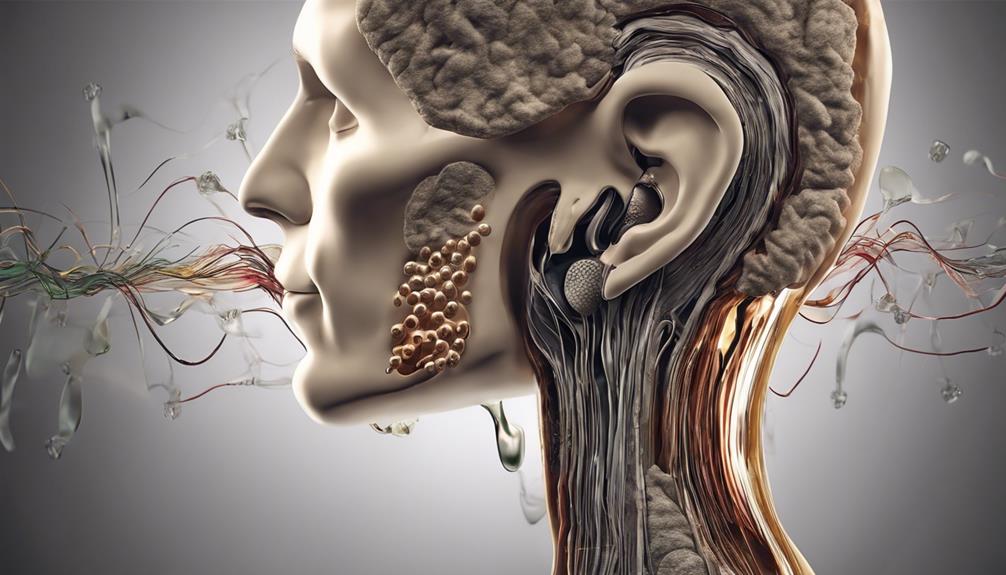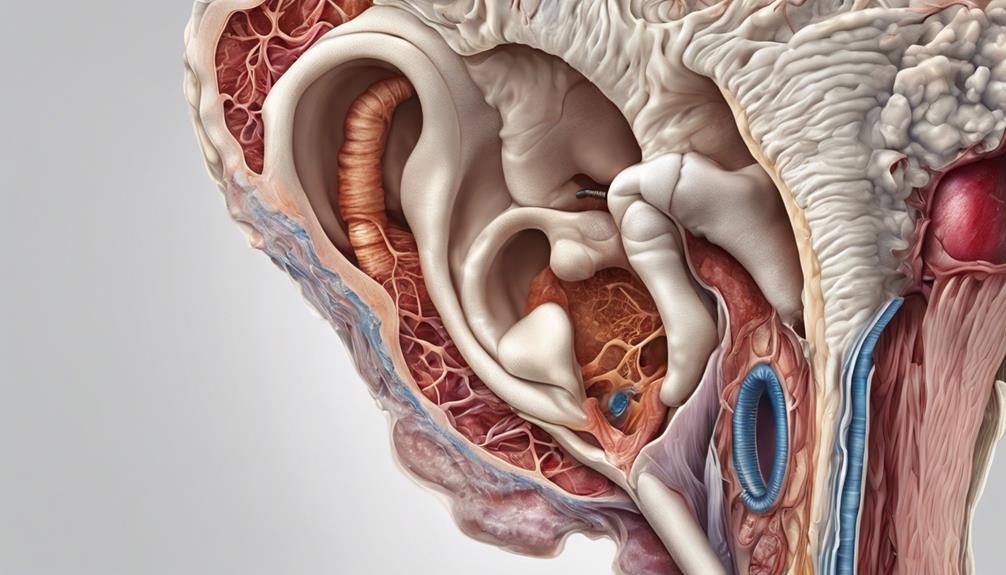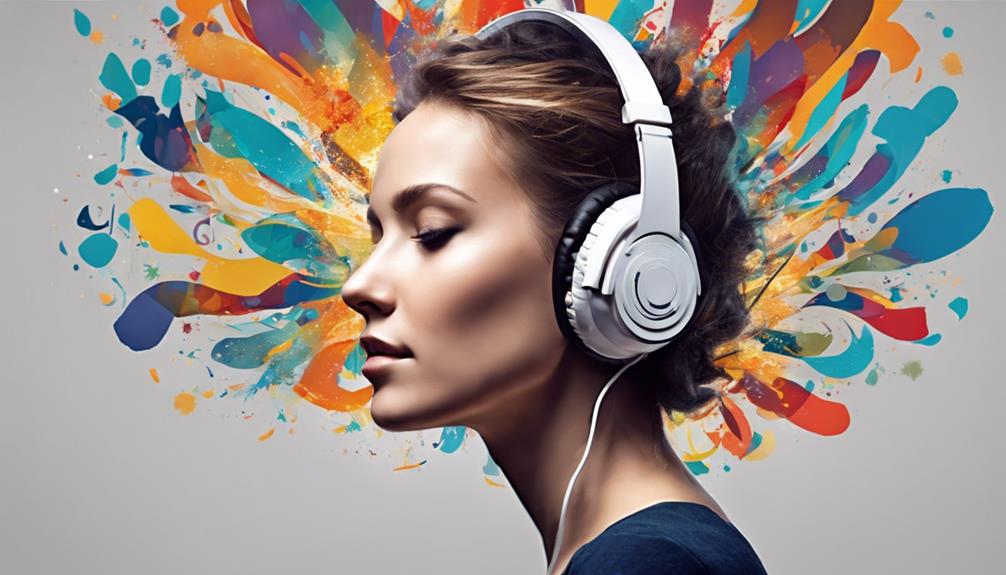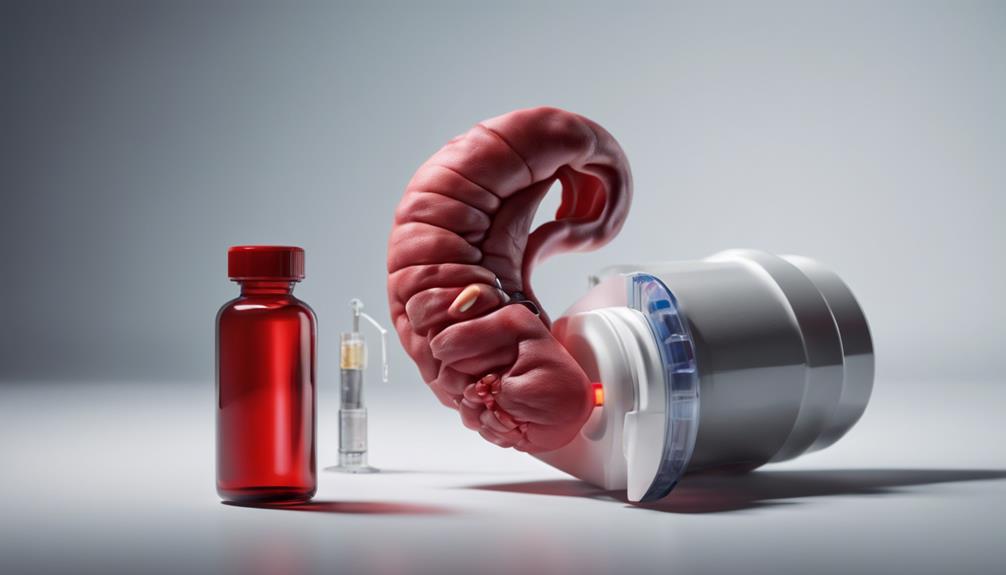Studying the impact of alcohol on our hearing is like navigating a labyrinth, where each turn reveals a new layer of understanding. Picture this: a symphony playing softly in a gentle whisper, gradually fading into a peaceful silence.
This subtle yet profound shift encapsulates the gradual onset of alcohol-induced hearing loss. So, what exactly happens within our auditory system when alcohol is involved? Let's uncover the intricate mechanisms at play and shed light on the connection between alcohol consumption and hearing impairment.
Key Takeaways
- Alcohol disrupts inner ear fluid balance and blood vessels, affecting sound perception.
- Chronic alcohol consumption leads to irreversible hearing damage and tinnitus risk.
- Oxidative stress from alcohol harms cochlear cells and auditory nerves.
- Understanding the connection between alcohol and inner ear damage is vital for prevention and preservation of auditory health.
Mechanisms of Alcohol-Induced Hearing Loss
Alcohol consumption can lead to detrimental effects on hearing through various mechanisms, highlighting the complex relationship between alcohol and auditory function. The inner ear and auditory cortex are particularly vulnerable to the damaging effects of excessive alcohol intake. Alcohol exposure can disrupt the delicate balance of inner ear fluid composition, leading to changes in hearing sensitivity. Additionally, alcohol-induced swelling of blood vessels in the inner ear can impair the proper functioning of these vital structures, contributing to hearing difficulties.
Cocktail deafness, a temporary hearing loss often experienced after a night of heavy drinking, is a common manifestation of alcohol's impact on hearing. This condition typically affects the perception of low-frequency sounds, indicating a specific vulnerability of the auditory system to alcohol-related damage. Furthermore, individuals who consume alcohol excessively may also be at an increased risk of developing tinnitus, a ringing or buzzing sensation in the ears, further underscoring the intricate relationship between alcohol consumption and auditory health.
Impact of Chronic Alcohol Consumption

Chronic alcohol consumption significantly impacts the auditory cortex of the brain, compromising sound processing and understanding, thus underscoring the lasting consequences of excessive alcohol intake on hearing health.
This long-term effect of alcohol abuse on hearing is a serious concern, with heavy drinking being a key factor in the development of hearing loss. The cumulative effects of chronic alcohol consumption on hearing can result in irreversible damage, highlighting the importance of moderation in alcohol intake to preserve auditory function.
Studies have shown a positive association between chronic alcohol consumption and the prevalence of hearing loss, emphasizing the need for awareness of the risks involved. The impact of chronic alcohol consumption on hearing health extends beyond temporary impairments, potentially leading to enduring issues that can significantly impact an individual's quality of life.
Role of Oxidative Stress in Hearing Damage
Amidst the complexities of hearing damage, the role of oxidative stress emerges as a critical factor in understanding the detrimental effects of alcohol consumption on auditory health. Oxidative stress, triggered by alcohol consumption, can inflict harm on the delicate cochlear hair cells within the inner ear. These cells are vital for translating sound vibrations into electrical signals that the brain interprets as sound. Acetaldehyde, a toxic byproduct of alcohol metabolism, poses a particular threat to these hair cells, potentially leading to hearing loss, tinnitus, and balance issues.
Furthermore, thiamine deficiency, often associated with chronic alcohol abuse, can negatively impact auditory and vestibular nerves, compounding the risk of hearing damage. Changes in blood flow induced by alcohol consumption can also play a role in harming the inner ear structures, further contributing to potential hearing impairments. Understanding the mechanisms through which oxidative stress affects the auditory system highlights the intricate relationship between alcohol consumption and hearing health.
Connection Between Alcohol and Inner Ear

In the context of auditory health, the relationship between alcohol consumption and the inner ear structures is a critical area of study due to the potential detrimental effects on hearing function. When considering the impact of drinking alcohol on hearing, it's essential to understand how it affects the inner ear. Here are some key points to consider:
- Alcohol exposure can lead to toxic effects on cochlear hair cells in the inner ear, contributing to hearing loss.
- Acetaldehyde, a byproduct of alcohol metabolism, is toxic to the delicate hair cells in the cochlea, affecting auditory function.
- Alcohol-induced oxidative stress can damage inner ear structures, potentially leading to tinnitus and balance disorders.
- Changes in blood flow caused by alcohol consumption can harm inner ear cells, exacerbating hearing and balance issues.
Understanding the connection between alcohol and the inner ear sheds light on the mechanisms through which alcohol consumption can lead to hearing impairments and balance disturbances.
Preventing Alcohol-Related Hearing Impairment
To prevent alcohol-related hearing impairment, understanding the impact of alcohol on auditory health is crucial. Excessive alcohol intake can lead to ear damage through various mechanisms such as alterations in inner ear fluids and damage to the auditory cortex. Implementing preventive measures can help protect hearing and reduce the risk of alcohol-induced hearing issues. Below is a table outlining some strategies to mitigate alcohol-related hearing impairment:
| Preventive Measures | Description | Benefits |
|---|---|---|
| Limit Alcohol Consumption | Moderation in alcohol intake can reduce the risk of inner ear damage. | Preserves auditory health |
| Use Hearing Protection | When in loud environments or events where alcohol is present, use earplugs or earmuffs. | Minimizes exposure to harmful noise levels |
| Regular Hearing Check-ups | Routine evaluations can detect early signs of hearing impairment. | Enables timely intervention and treatment if needed |
Frequently Asked Questions
How Does Alcohol Cause Hearing Loss?
Alcohol can cause hearing loss by damaging the auditory cortex in the brain and resulting in processing sound issues. Heavy drinking can lead to temporary hearing loss, known as cocktail deafness, often affecting low-frequency sounds.
Alterations in inner ear fluid composition and blood vessel swelling in the ears due to alcohol consumption contribute to various auditory problems. Research highlights potential long-term hearing effects beyond just hearing loss from alcohol consumption.
What Effect Does Alcohol Have on Auditory Processing?
Alcohol can impair auditory processing, affecting sound comprehension and noise filtering. Research suggests that heavy drinking can lead to difficulties in understanding speech quickly and distinguishing voices in loud environments.
Damage to the auditory cortex from alcohol use may result in challenges with sound translation and background noise filtering, impacting hearing even if the ears are physically healthy. Symptoms may include trouble comprehending rapid speech and differentiating between sounds.
What Part of the Brain Affects Hearing Being Affected by Alcohol?
When alcohol consumption impacts hearing, the part of the brain affected is the auditory cortex. This region is crucial for processing sound and speech comprehension.
Heavy drinking can lead to brain damage that affects the auditory cortex, leading to difficulties in understanding speech and distinguishing voices in noisy environments.
Even when the ears are healthy, damage to the auditory cortex can still result in hearing issues due to alcohol consumption.
What Are the First Signs of Liver Damage From Alcohol?
When it comes to identifying the initial signs of liver damage from alcohol consumption, it's crucial to pay attention to symptoms like:
- Fatigue
- Unexplained weight loss
- Abdominal pain
- Elevated liver enzymes in blood tests
- Skin and eye yellowing (jaundice)
- Swelling in the abdomen, ankles, or legs
- Persistent nausea, vomiting, and loss of appetite
These indicators can serve as early warnings of potential liver damage caused by excessive alcohol intake.
Conclusion
In conclusion, it's evident that alcohol consumption can have detrimental effects on our hearing health. By understanding the mechanisms behind alcohol-induced hearing loss and the impact of chronic alcohol consumption, we can take proactive steps to prevent potential damage.
It's crucial to prioritize our hearing health by seeking regular screenings and addressing any alcohol-related issues. Let's raise a toast to our ears and make informed choices for a healthier auditory future. Cheers to hearing well!











